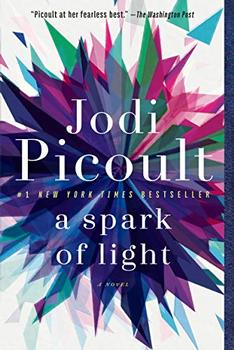Summary | Excerpt | Reading Guide | Reviews | Beyond the Book | Readalikes | Genres & Themes | Author Bio

FIVE P.M.
The Center squatted on the corner of Juniper and Montfort behind a wrought-iron gate, like an old bulldog used to guarding its territory. At one point, there had been many like it in Mississippi – nondescript, unassuming buildings where services were provided and needs were met. Then came the restrictions that were designed to make these places go away: the halls had to be wide enough to accommodate two passing gurneys; any clinic where that wasn't the case had to shut down or spend thousands on reconstruction. The doctors had to have admitting privileges at local hospitals -- even though most were from out of state and couldn't secure them – or those clinics risked closing, too. One by one they shuttered their windows and boarded up their doors. Now, the Center was a unicorn – a small rectangle of a structure painted a fluorescent flagrant orange, like a flag to those who had traveled hundreds of miles to find it. It was the color of safety; the color of warning. It said: I'm here if you need me. It said, Do what you want to me; I'm not going.
The Center had suffered scars from the cuts of politicians and the barbs of protesters. It had licked it wounds and healed. At one point it had been called the Center for Women and Reproductive Health. But there were those who believed if you do not name a thing, it ceases to exist, and so its title was amputated, like a war injury. But still, it survived. First it became the Center for Women. And then, just: the Center.
The label fit. The Center was the calm in the middle of a storm of ideology. It was the sun of a universe of women who had run out of time and had run out of choices, who needed a beacon to look up to.
And like other things that shine so hot, it had a magnetic pull. Those in need found it the lodestone for their navigation. Those who despised it could not look away.
#
Today, Wren McElroy thought, was not a good day to die. She knew that other fifteen-year-old girls romanticized the idea of dying for love, but Wren had read Romeo and Juliet last year in eighth grade English and didn't see the magic in waking up in a crypt beside your boyfriend, and then plunging his dagger into your own ribs. And Twilight – forget it. She had listened to teachers paint the stories of heroes whose tragic deaths somehow enlarged their lives rather than shrinking them. When Wren was six, her grandmother had died in her sleep. Strangers had said over and over that dying in your sleep was a blessing, but as she'd stared at her Nana, waxen white in the open coffin, she didn't understand why it was a gift. What if her grandmother had gone to bed the night before thinking, In the morning, I'll water that orchid. In the morning, I'll read the rest of that novel. I'll call my son. So much left unfinished. No, there was just no way dying could be spun into a good thing.
Her grandmother was the only dead person Wren had ever seen, until an hour ago. Now, she could tell you what dying liked like, as opposed to just dead. One minute, Olive had been there, staring so fierce at Wren -- as if she could hold onto the world if her eyes stayed open – and then, in a beat, those eyes stopped being windows and became mirrors, and Wren saw only a reflection of her own panic.
She didn't want to look at Olive anymore, but she did. The dead woman was lying down like she was taking a nap, a couch cushion under her head. Olive's shirt was soaked with blood, but had ridden up on the side, revealing her ribs and waist. Her skin was pale on top and then lavender, with a thin line of deep violet where her back met the floor. Wren realized that was because Olive's blood was settling inside, just two hours after she'd passed. For a second, Wren thought she was going to throw up.
Excerpted from A Spark of Light by Jodi Picoult. Copyright © 2018 by Jodi Picoult. Excerpted by permission of Ballantine Books. All rights reserved. No part of this excerpt may be reproduced or reprinted without permission in writing from the publisher.
Your guide toexceptional books
BookBrowse seeks out and recommends the best in contemporary fiction and nonfiction—books that not only engage and entertain but also deepen our understanding of ourselves and the world around us.